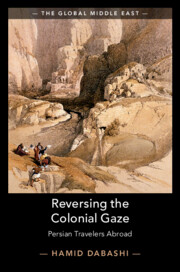Book contents
- Reversing the Colonial Gaze
- The Global Middle East
- Reversing the Colonial Gaze
- Copyright page
- Dedication
- Contents
- Figures
- Preface
- Acknowledgments
- Introduction
- 1 Mr. Shushtari Travels to India
- 2 Mirza Abu Taleb Travels from India
- 3 An Ilchi Wonders about the World
- 4 A Colonial Officer Is Turned Upside-Down
- 5 A Shirazi Shares His Travelogues
- 6 A Wandering Monarch
- 7 Hajj Sayyah Leads a Peripatetic Life
- 8 In the Company of a Refined Prince
- 9 A Wandering Mystic
- 10 In and out of a Homeland
- 11 The Fact and Fiction of a Homeland
- 12 Professor Sayyah Comes Home to Teach
- Conclusion
- Index
5 - A Shirazi Shares His Travelogues
Published online by Cambridge University Press: 19 December 2019
- Reversing the Colonial Gaze
- The Global Middle East
- Reversing the Colonial Gaze
- Copyright page
- Dedication
- Contents
- Figures
- Preface
- Acknowledgments
- Introduction
- 1 Mr. Shushtari Travels to India
- 2 Mirza Abu Taleb Travels from India
- 3 An Ilchi Wonders about the World
- 4 A Colonial Officer Is Turned Upside-Down
- 5 A Shirazi Shares His Travelogues
- 6 A Wandering Monarch
- 7 Hajj Sayyah Leads a Peripatetic Life
- 8 In the Company of a Refined Prince
- 9 A Wandering Mystic
- 10 In and out of a Homeland
- 11 The Fact and Fiction of a Homeland
- 12 Professor Sayyah Comes Home to Teach
- Conclusion
- Index
Summary
In Chapter 5, “A Shirazi Shares His Travelogues,” I follow Mirza Saleh Shirazi’s Safar-Nameh (1815). Perhaps the most influential public intellectual of his time, Mirza Saleh Shirazi began his career as a courtier with the reformist Qajar prince Abbas Mirza, by whose royal decree he managed to travel to Europe, write one of the most influential travelogues of his time, and bring back one of the earliest printing machines to his homeland, with which to publish the very first widely circulated newspaper in his country, Kaghaz-e Akhbar. What is peculiar to Mirza Saleh Shirazi and his travel narrative is his pioneering work in helping the formation of a public sphere in his homeland. Simplification of Persian prose, introduction of the printing machine, description of modern social institutions such as parliamentary democracy and the social functions of media, and undertaking the publication of a newspaper in his homeland all come together to mark Mirza Saleh as definitive to the making of an Iranian (Persian-speaking) public sphere, upon which he or anyone else could claim to be a “public intellectual.”
Keywords
- Type
- Chapter
- Information
- Reversing the Colonial GazePersian Travelers Abroad, pp. 131 - 153Publisher: Cambridge University PressPrint publication year: 2020

